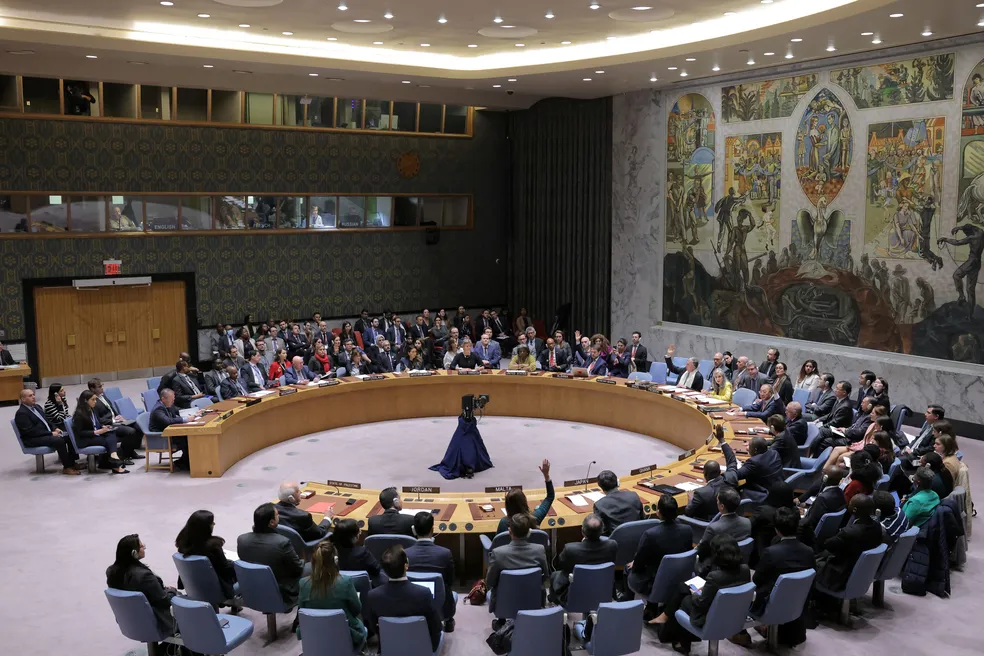Reading the news and the speeches of German government politicians (for years now), one quickly understands that the country has an interest in attracting foreigners because of the lack of domestic labour. But the practice of German society and government shows the exact opposite.
During what became known as the “Refugee Crisis” between 2014-15, the then German Chancellor, Angela Merkel, gave a speech in which she uttered an emblematic phrase that still resonates in the country today: “we can handle it” (wir schaffen das). At the time, she was defending her open-door policy, through which thousands of migrants, fleeing war in Middle Eastern and North African countries, arrived at the doors of the European Union. Partly perceived as a way of “rebranding” the country, still known today for its dark National Socialist past, the policy of welcoming refugees was part of a larger policy of attracting foreign labour, with the aim of reducing the problem the country has faced for years.
At the end of 2022, data from the Institute of the German Economy (IW)1 pointed to a “gap” of half a million people “missing” to fill vacancies in the country. This figure means that, considering the vacancies in Germany (in all areas) and the number of unemployed people to fill them, around 533,000 more people would be needed to meet demand. Germany ended 2023 with a situation that could be considered “full employment”, with only 5.7 per cent2 unemployment.

This lack of people can be seen on a day-to-day basis far beyond the recurring signs in practically every business advertising open positions, sometimes urgently looking for reinforcements. Many businesses end up reducing their opening hours because there are not enough people to work at certain times. But it is not just commerce that suffers. Public services that are necessary for the daily lives of millions of people, such as crèches, schools and even government offices, start opening later, closing earlier or opening only a few days a week. And the hole does not get any smaller; on the contrary, it keeps getting worse year after year3. With a rate of 1.53 children per woman (in 2020), Germany’s population growth is stagnating. The solution to the lack of people therefore seems clear: look for people abroad.
Looking for workers abroad is nothing new for Germany. Right after the Second World War, due to what became known as the “German Economic Miracle” in the 1950s and 1960s, the country experienced a labour shortage. That is when Bonn (the country’s capital at the time) signed agreements with Turkey, Italy, Spain and Greece so that nationals from these countries could be hired by German companies and go to work in the country as “guest workers” (Gastarbeiter). However, the fact that these people came to work in Germany was thought to be limited, with no intention on the part of the German government for them to stay for long periods of time. They were only meant to fill the gap in the labour force and, once this issue had been resolved, they were to return to their countries4.
Thus, they were offered tents close to the workplace as “housing” and, in order to bring them back after a certain period of time, they were not offered the opportunity to learn the language properly or to bring them into German society. As a result, these “guest workers” remained on the margins, without feeling part of the new country and without integrating. The policy of seeking out foreign labour was put on hold in any case with the first Oil Shock in the 1970s when job vacancies shrank. Many foreign workers, however, stayed.
The result of this is that 28.7 per cent of the German population has a “migratory past”5, i.e. they are the children or grandchildren of foreigners who came to work temporarily and made a life in Germany. A recurring problem, however, is that these people are not considered by many “root Germans” to be “Germans”. In practice, many are not officially German, since their parents or grandparents were not entitled to German citizenship, even though they worked and paid taxes for decades, and so these people who were born and raised here are only considered nationals of other countries. You read a lot about the “bad integration” of these foreigners who speak “broken German”, “have strange surnames” and “do not follow German law”. This is because, for many, being “German” goes far beyond having citizenship or speaking the language. “Good integration”, however, is a meaningless term, since nobody says what it actually means – most likely because being clearer about it might require bringing in vocabulary that harks back to discourses from the 1920s and 30s. For many, then, it seems to be better to continue with the vaguer discourse.
Faced with a new labour shortage, Germany is once again trying to attract foreigners, without concluding specific agreements with countries. Politicians in Berlin have been talking for years about the labour shortage and the need to make the country more “attractive” to foreigners who have the experience and skills to fill the vacancies that the German population can no longer fill.
Again, reading the news, one can see the political will to make this happen. Laws have been passed to ensure that diplomas are recognised, that residence permits are issued more quickly and, more recently, that it is even possible to obtain German citizenship in less time – in some cases, up to a record time of three years. Even so, data from the Expat Insider survey, which analyses the attractiveness of countries for foreigners, shows that Germany ranks 49 out of 53 countries analysed6. Astonished, most of the time, many Germans wonder why. One just has to not be a “root German” to understand.
Despite providing job security, foreigners rate Germany poorly in areas such as digitalisation (which is almost non-existent), complicated public administration (which makes practical life difficult), a saturated property market (which makes budgeting or housing impossible) and sociability (which prevents the much-prized integration). Around 55 per cent of those interviewed said they found it difficult to make friends locally, while a third said they felt Germans were unfriendly towards foreigners7. These reports show that everyday life in Germany goes far beyond having to deal with the cultural “coldness” of the Germanic people. A practical result of this is that, once again, foreign workers are marginalised, gathering only among their own or other foreigners, often not developing their language skills and, consequently, “not integrating” properly.
Beyond this “social” part, we realise that the desire to make the country attractive to foreigners ends with speeches and the passing of more “attractive” laws. This is because there is no financial, capacity or human investment in the country’s infrastructure to receive these foreigners. The so-called “Foreigners’ Offices” (Ausländerbehörden) are a major headache for foreigners in Germany. There are various reasons for this: the need to resolve almost everything by letter, waiting months (or years) for appointments or the “silence” of the offices (which do not reply to letters, emails or phone calls). This German public office is one of the great multipliers of the feeling harboured by many foreigners that Germans do not want outsiders in their country.
The struggle is real, the Darmstadt Ausländerbehörde never answer emails, phone calls or written requests for appointments, their great solution was come everyday at 4am and start a line… @Stadt_Darmstadt @dwnews @hessenschau #Darmstadt #Ausländerbehörde pic.twitter.com/Zsh7uxjd46
— Linda Martinez (@LindaSMartinez) August 23, 2022
A Twitter/X user talks about the wait at the Foreigners’ Office in Darmstadt, where people arrived at 4am and could spend the whole day waiting for an appointment that would not be until months later, without knowing for sure that they would get it.
Many have denounced the “inhumane” conditions that some Foreigners’ Offices put foreigners through, with hours of waiting in the cold to schedule an appointment to deal with a matter (which will never be on the same day or month) or waiting months to get the documents needed to stay or work legally in Germany. These complaints occasionally appear as minor posts on news portals, but never on television news programmes. When a newspaper decides to ask the town halls responsible for these places about these conditions, the answers are always the same: there are no staff to deal with the issue.
The truth is that there is no interest in investing in these places. Practice shows a reality that is the opposite of political discourse, that there is no real interest in bringing in outsiders. Passing new laws that cannot be carried out by officials on the ground is a policy made for appearances. Other countries, even in Europe, claim to want foreigners, pass laws to attract them and invest in making processes run more smoothly. In the third world economy, however, there appears to be a belief that talk is enough.
Germany’s current political development is creating yet another fear for many foreigners. Political polls, conducted almost every week, show that the far-right party “Alternative for Germany” (AfD) is consolidating its position as the second-strongest political party in the country. Behind only the centre-right “Christian Democratic Union of Germany” (CDU), Merkel’s party, which has developed an increasingly populist discourse through its president Friedrich Merz. Three opposing parties share the government: the centre-left “Social Democratic Party of Germany” (SPD), the right-wing “Liberal Democratic Party” (FDP) and the left-wing “Greens“. The so-called “Traffic Light Coalition” (which refers to the colours of the three parties) has found it difficult to convey the image that Germany has a stable government, as in the last two years of government, ministers from opposing parties have openly disagreed in public. The AfD populists are taking advantage of the government’s disunity to attack it and heat up the public debate, bringing more disunity and discord, playing by the far-right play book. On the other hand, in search of political survival, CDU politicians have embarked on adopting populist slogans so as not to lose votes to the far right, making an almost identical speech.
With notorious fascists and neo-Nazis in its ranks, the AfD very recently caused a wave of protests after it was revealed by the Correctiv research centre that party members held a secret meeting to discuss a secret plan to deport millions of “foreigners” (who, for them, are also people who may have German nationality but are not “root Germans”)8. This banner is known by right-wing extremists as “remigration” and resembles Nazi plans from the 1920s and 30s. More than a million people across Germany have taken to the streets in several cities since this plan was unveiled at the beginning of January to show their disgust at the growth of the far right9.
Not only ordinary citizens, but also politicians and members of the government have taken a stand against the party. In a video on the Chancellery’s official Instagram channel, Chancellor Olaf Scholz expressed his concern for foreigners who are currently asking themselves “if they have a future in Germany“, then emphasised that they do and rejected the far right10. In fact, as Scholz said, foreigners (or people with a “migrant background”) are present in every German constellation: be it the baker, one’s work colleague, one’s friend from school or university or one’s neighbour. The statement, like the protests, is also intended to convey the image that the majority in Germany defends the right of foreigners to stay and stands against extremists. An important speech, but speech nonetheless.
However, a growing fifth of German voters still intend to vote for AfD lists. In some states of the former East Germany, the party has as many as 30 per cent of its supporters among the electorate and elects executive positions, such as in the town hall of a city in the state of Saxony-Anhalt.
Furthermore, the “idea” causes the “reality” in many cases. Germans’ unwillingness to interact with foreigners causes them to isolate themselves in foreigner niches, which in turn makes it difficult for them to integrate into society. This lack of integration then becomes an argument that feeds populists who grow rapidly and can wreak political and social havoc.
In a nutshell, the German paradox of the foreigner translates as: the foreigner is necessary, they are even portrayed as the country’s “salvation”, but at the same time they are used as a scapegoat for the country’s various ills. Between “attracting” and “repelling”, Germany continues to muddle through in search of accepting what seems to be the only solution to its problems: opening up to the different, the foreigner.
1 https://www.deutschlandfunk.de/arbeitsmarkt-fachkraeftemangel-zuwanderung-arbeitslosigkeit-deutschland-100.html
2 https://www.arbeitsagentur.de/news/arbeitsmarkt
3 https://www.spiegel.de/wirtschaft/fachkraeftemangel-erreicht-neues-rekordniveau-a-6cebffa8-d308-4a90-9d36-e9936ee1d031
4 https://www.planet-wissen.de/geschichte/deutsche_geschichte/geschichte_der_gastarbeiter/index.html
5 https://www.svr-migration.de/wp-content/uploads/2023/12/SVR-Kurzbuendig_Einwanderung_2023.pdf
6 https://www.iamexpat.de/expat-info/german-expat-news/unhappy-and-lonely-germany-ranks-49th-new-expat-countries-survey
7 https://www.ovb-online.de/weltspiegel/made-in-germany-ist-ein-witz-warum-sich-auslaender-in-deutschland-ueberhaupt-nicht-wohl-fuehlen-92417328.html
8 https://correctiv.org/aktuelles/neue-rechte/2024/01/10/geheimplan-remigration-vertreibung-afd-rechtsextreme-november-treffen/
9 https://www.focus.de/politik/deutschland/die-schweigende-mitte-erhebt-ihre-stimme-wir-sind-die-brandmauer-bis-zu-5000-menschen-demonstrieren-in-cottbus_id_259594462.html
10 https://www.instagram.com/p/C2SG8nROk91/



